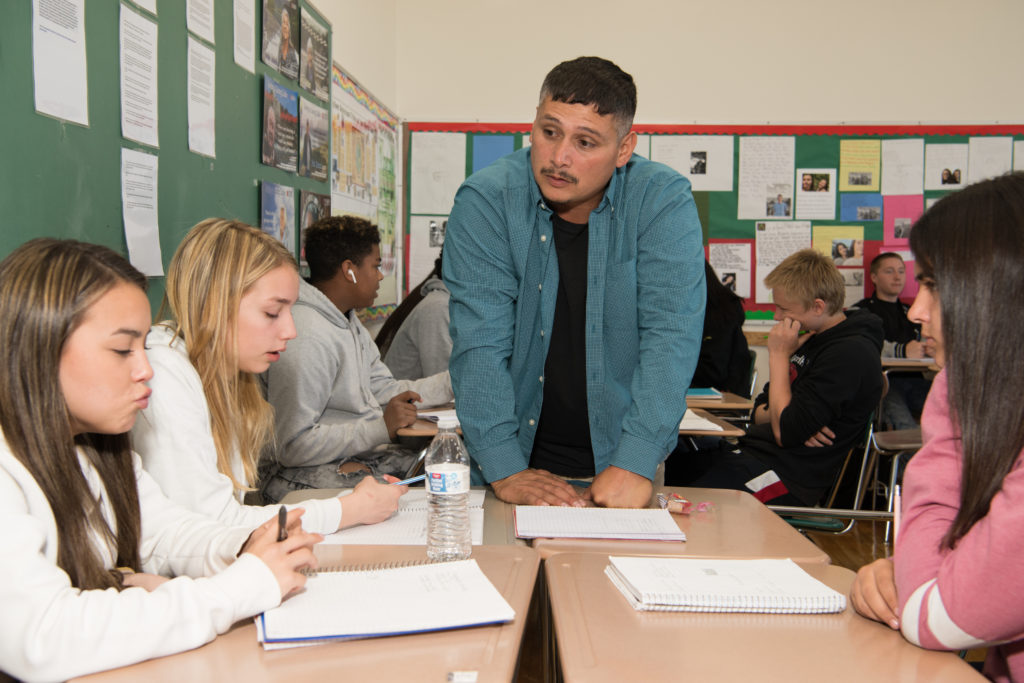Photos by Kim Sanford
“Aiy-ye-kwee” is a Yurok greeting, but it means much more than hello, James Gensaw explains to his ninth grade students at Eureka High School in Humboldt County.
“It has more feeling. It means I missed you, I’m so happy to
see you. It applies to places. When I go fishing or kneeling at the mouth of
the Klamath River and I wash my hands in the ocean, which is considered a
living being and ceremonial place, I say ‘aiy-ye-kwee,’ which means ‘hello, you
make me so happy.’ It is an important phrase.”
Yurok is a Native American language that came close to
extinction, as elders passed away. But Gensaw has played a key role in
revitalizing the language, including teaching four levels of Yurok to high
school students at Eureka High.
The Eureka Teachers Association member intertwines
instruction with stories, songs and games, building a sense of community in the
classroom. Approximately half of his students are Native American, and
many are Yurok, but not all. While students say Yurok is easy to learn, it’s a
complicated language — for example, there are 20 different ways of counting,
depending on whether one is counting animals, flat things, round things, money
or people.

Gensaw wrote the curriculum, and his classes meet world
language and “a-g” college preparatory requirements. Two students in his
fourth-year class received Seal of Biliteracy awards for mastery of the
language after passing difficult tests, including translation.
“One of my students said it saved her life,” shares Gensaw.
“She was a Yurok tribal member. She was getting in big trouble with the law.
She told me that learning Yurok got her off drugs and prevented her from going
to prison. It helped her to understand who she was.”
He tells his students that what they are doing is special.
“Millions of people are able to speak Spanish, French and German, but Yurok has
only 35 conversationally fluent speakers, so you are important, needed and
valuable.”
His students are proud to be revitalizing an ancient
language.
“I wanted to learn this language to help keep it alive,”
says Native American student Gracie Anderson, whose great-aunt speaks
Yurok.
Kirsten Simpson has family who are Yurok. “[The class] makes
me feel more connected,” she says. “And it’s cool.”
Gensaw, a Yurok tribal member, grew up on the Yurok
Reservation in Klamath. He was raised by his grandparents, who knew little of
the Yurok language because, like many in their generation, they were forced to
attend boarding school. (Beginning in the 1800s, the practice of forcibly
removing Native American children from their homes was intended to coerce
assimilation by wiping out their memories of Native language and culture.)
After high school, he took community language classes
offered by the Yurok Tribe and worked with Barbara McQuillen, a teacher at Del
Norte High School and member of Del Norte Teachers Association. “A part of me
always felt something was missing, so I immersed myself in learning Yurok,”
Gensaw says.
After enrolling at College of the Redwoods, he became an
intern in the Yurok Tribe Language Program and worked with elders whose first
language was Yurok.
“I was very blessed to have the opportunity,” Gensaw says.
“They became like family. I documented and recorded more than 1,000 hours with
nearly a dozen elders. That time contains some of my fondest memories, and also
some of my saddest, because everyone I worked with has now passed away.”
Our 2019-2020 Innovation Issue
James Gensaw is one of the innovative educators we highlight this year. Meet the rest:
- Jennifer Barry guides Special Ed students in work and life skills
- Sherinda Bryant teaches English through a social justice lens
- Somphane Hunter creates community in the kitchen
- Daniel & Dennis Gibbs set a STEM career path for students
- Becky McKinney builds relationships; students learn NGSS along the way
- Juan Padilla‘s big idea brings science opportunity to all kids
- Jorge Perez creates an oasis of scientific excellence at community college
The Yurok Tribe, the largest in California with 6,400 enrolled members, partnered with UC Berkeley to create the Yurok Teacher Institute, which has the goal of restoring the language and developing credentialed Yurok language teachers in public schools. Gensaw earned his credential through the program.
He later worked with Andrew Garrett, director of UC
Berkeley’s Yurok Language Project, and a team of elders to create an online
Yurok language dictionary and database. Gensaw also helped develop a free
language app for Android and iPhones, and created online Yurok lessons for
Quizlet and Kahoot! to help other educators.
He was recently approached by College of the Redwoods to
teach a Yurok class as a pilot project, which he finds exciting.
“It means everything to me having Yurok as a living language again,” says Gensaw. “It’s changed my life and helped me grow into a stronger man. It’s a way to honor my elders. It’s a way to give Native American students resilience so they can find out more about themselves and their culture. To be part of taking an almost extinct language to a living, flourishing language has been awesome.”
The Discussion 0 comments Post a Comment